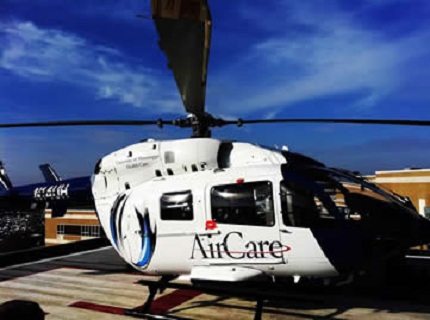Department of Helicopter Transport
Frequently Asked Questions about AirCare
 Can your team come to our hospital/ambulance service and teach a class?
Can your team come to our hospital/ambulance service and teach a class?
AirCare provides support to the entire State of Mississippi, its hospitals, fire services, law enforcement personnel, and EMS providers through continuing education programs and public awareness demonstrations.
AirCare is involved in several outreach educational programs. Our team or affiliates can come to your location and provide training in emergency and critical care medicine, helicopter operations, MSWIN communication, or other specialized classes specific to your group.
Many of our classes are certified for continuing education hours for healthcare professionals and first responders. For more information about our First Hands Program or any other education/training needs, please feel free to contact us.
Can your helicopter visit our event?
AirCare participates in community festivals and events in a variety of types and sizes. Although AirCare makes every attempt to honor all PR requests we have committed to, the PR requests may have to be canceled in the event of a patient flight, aircraft maintenance or weather.
How many crew members are on the helicopter?
AirCare flies with three crew members - a pilot and two medical team members.
What is your crew configuration?
The typical flight crew configuration for AirCare is a flight nurse and aMS-CCP.
We will occasionally use the following crew configurations:
- Nurse/Nurse
- MS-CCP/MS-CCP
- Nurse/Paramedic
- MS-CCP/Paramedic
During NICU transports, AirCare works closely with Mississippi's only Level IV NICU. We will add or replace one of the normal medical crew members with a neonatal nurse whom are experts in this very focused population.
Do you have a fly-a-long program?
Because of our current expansion, our U-fly program is currently on hold. Continue to check back with us as we currently cannot give an approximate time the program will return.
How do I get a job at AirCare?
AirCare employment opportunities can be found at www.umc.edu. AirCare positions are carefully evaluated to find the best possible clinician. Education, experience and critical thinking skills are important in this air transport environment. We recommend researching the air medical industry to find valuable information. Contact us if you have any specific questions regarding employment.
Can I make a financial contribution to AirCare?
Donations can be made to AirCare by clicking here.
What happens if I don't have medical insurance? Will you still come pick me up?
AirCare transports any patient experiencing an emergency medical condition without questioning the patient's ability to pay.
What is your service area?
AirCare serves the entire state of Mississippi.
Why is CAMTS accreditation important?
The accreditation of an air ambulance provider means everything regarding safety, service, ethics, and training. The Commission on Accreditation of Medical Transport Systems or CAMTS is the "Gold Standard" for air ambulance providers. During a voluntary audit, conducted every three years, a team of surveyors reviews all flight operations (both on paper and by site visit) for compliance to a set of standards that are above the minimum standard operating model. Only the safest and best-of-the-best are awarded this prestigious accreditation. Contact us if you have questions about CAMTS accreditation and we can explain more about this, or visit the CAMTS website.
What kind of weather does AirCare fly in?
Our aircraft and pilots are certified for the flight using instrument flight rules (IFR). This means we can fly at times when the flight crew cannot see the ground or other aircraft in the sky. By utilizing the aircraft instruments such as onboard weather radar and redundant GPS navigation and autopilot systems, our pilots can fly the aircraft from airport to airport using similar routes and procedures as commercial airlines. Instrument flying involves a higher degree of precision and training than visual flying, and it allows us to complete transports that we otherwise would be unable to accept due to rain or low clouds fog. This does not mean, however, that we can fly in all weather. Some weather conditions, such as thunderstorms, lightning, and freezing rain are too severe to operate safely.
How can EMS use AirCare during IFR weather?
Many locations where AirCare responds are near airports that allow us to make IFR approaches. This would allow us to rendezvous with EMS at one of those airports. During the request for AirCare, MED-COM personnel will advise if a meeting at a nearby airport would be required. For more information on our IFR capabilities, click here.
Does it take longer for AirCare to respond when using IFR?
Yes. Using IFR can add time to our response due to the added safety precautions are taken during weather checks and flight planning. Placing AirCare on standby can help reduce or eliminate this delay.
Who does the maintenance on your helicopters?
All of AirCare's aircraft are maintained and operated by Med-Trans Corp.
How fast does your helicopter fly?
The cruise speed of our Air Bus EC 135 P2+ and EC 145 helicopters are approximately 120-130 knots or 138-150 mph.


